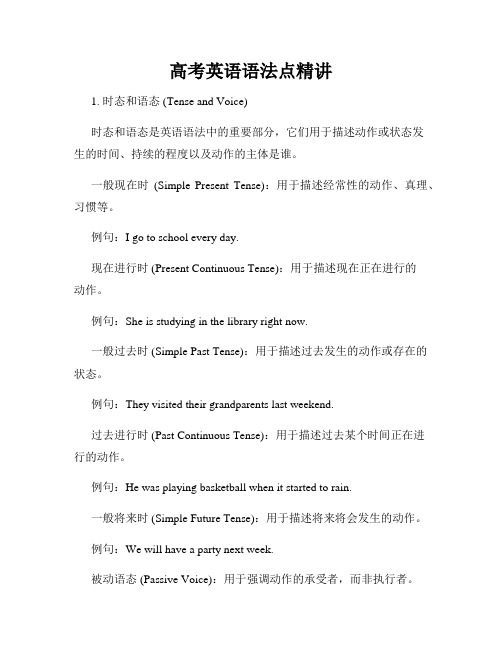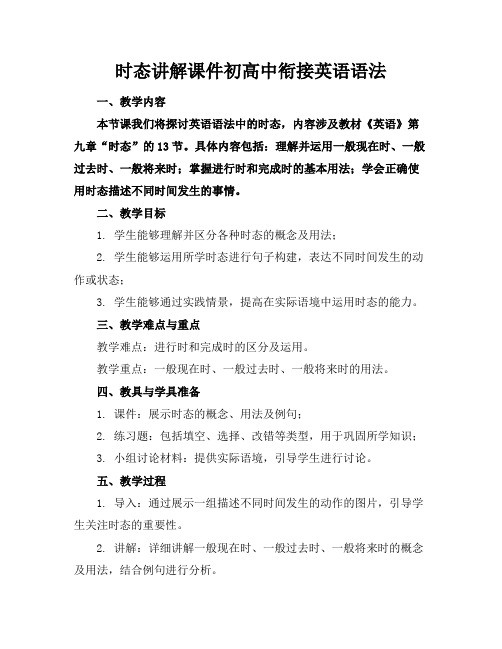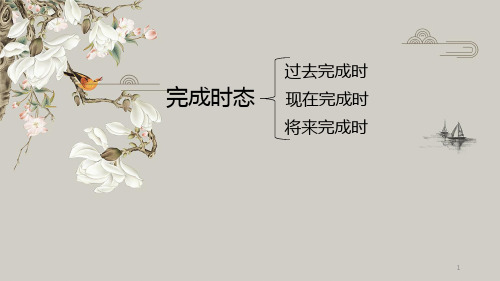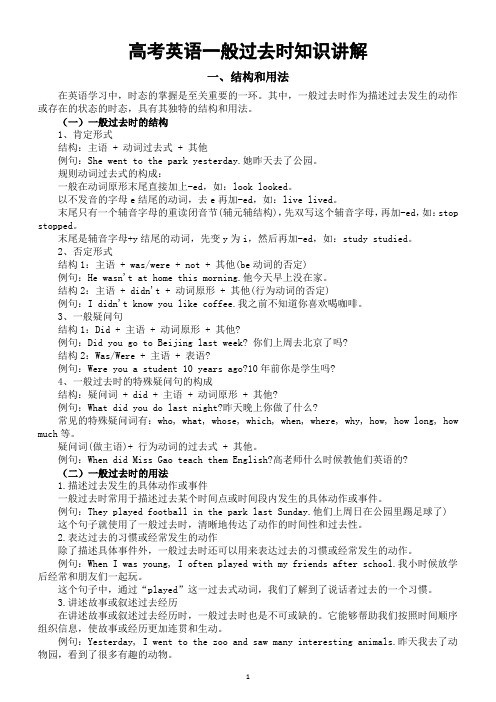高中英语最实用语法一般过去时、现在完成时、将来完成时讲解和经典习题讲课讲稿
高考英语语法点精讲

高考英语语法点精讲1. 时态和语态 (Tense and Voice)时态和语态是英语语法中的重要部分,它们用于描述动作或状态发生的时间、持续的程度以及动作的主体是谁。
一般现在时(Simple Present Tense):用于描述经常性的动作、真理、习惯等。
例句:I go to school every day.现在进行时 (Present Continuous Tense):用于描述现在正在进行的动作。
例句:She is studying in the library right now.一般过去时 (Simple Past Tense):用于描述过去发生的动作或存在的状态。
例句:They visited their grandparents last weekend.过去进行时 (Past Continuous Tense):用于描述过去某个时间正在进行的动作。
例句:He was playing basketball when it started to rain.一般将来时 (Simple Future Tense):用于描述将来将会发生的动作。
例句:We will have a party next week.被动语态 (Passive Voice):用于强调动作的承受者,而非执行者。
例句:The book was written by Mark Twain.2. 名词性从句 (Noun Clauses)名词性从句在句子中扮演名词的角色,可以作为主语、宾语或表语。
主语从句 (Subject Clauses):在句子中作为主语的从句。
例句:What he said was very inspiring.宾语从句 (Object Clauses):在句子中作为宾语的从句。
例句:I don't know where she went.表语从句 (Predicate Clauses):在句子中作为表语的从句。
高中英语时态语态讲解及习题上课讲义

高中英语时态语态讲解及习题上课讲义时态与语态一.一般现在时,表示现在经常性、习惯性的动作和状态,常见的时间状语包括sometimes, often, usually, always,occasionally, now and then,on weekends,onSundays,every week/month/year等She always takes a walk in the evening.He often does his homework in his study.1.一般现在时表示客观真理、科学事实及自然现象和谚语格言中,此用法即使出现在过去语境中,也用一般现在时。
The moon goes around the earth.Pride goes before a fall.骄者必败He said the earth is round.2.主句是一般将来时,由when,after, before, as soon as, the minute,whenever等引导的时间状语和由if, unless, so long as, once等引导的条件状语和however,even if等引导的让步状语从句中一般用一般现在时表示将来。
如:l’ll go there after I finish my work.If it rains tomorrow,I won’t go there.I will tell her when she comes tomorrow.Even if it rains tomorrow, the sports meeting will take place.3.在以here,there开头的句子里,go,come等少数动词的一般在时表示正在发生的动作。
例如:There goes the bell.铃响了。
There comes the bus.汽车来了。
Here she comes.她来了。
时态讲解课件初高中衔接英语语法

时态讲解课件初高中衔接英语语法一、教学内容本节课我们将探讨英语语法中的时态,内容涉及教材《英语》第九章“时态”的13节。
具体内容包括:理解并运用一般现在时、一般过去时、一般将来时;掌握进行时和完成时的基本用法;学会正确使用时态描述不同时间发生的事情。
二、教学目标1. 学生能够理解并区分各种时态的概念及用法;2. 学生能够运用所学时态进行句子构建,表达不同时间发生的动作或状态;3. 学生能够通过实践情景,提高在实际语境中运用时态的能力。
三、教学难点与重点教学难点:进行时和完成时的区分及运用。
教学重点:一般现在时、一般过去时、一般将来时的用法。
四、教具与学具准备1. 课件:展示时态的概念、用法及例句;2. 练习题:包括填空、选择、改错等类型,用于巩固所学知识;3. 小组讨论材料:提供实际语境,引导学生进行讨论。
五、教学过程1. 导入:通过展示一组描述不同时间发生的动作的图片,引导学生关注时态的重要性。
2. 讲解:详细讲解一般现在时、一般过去时、一般将来时的概念及用法,结合例句进行分析。
3. 实践:学生根据所学知识,完成填空、选择、改错等练习题,巩固时态知识。
4. 小组讨论:学生分小组,根据提供的实际语境,讨论并运用所学时态进行句子构建。
六、板书设计1. 时态讲解2. 内容:一般现在时一般过去时一般将来时进行时完成时3. 例句:展示各时态的典型例句七、作业设计1. 作业题目:根据所给提示词,完成下列句子(每个时态至少两个句子)。
改写下列句子,使其符合所要求的时态。
2. 答案:一般现在时:I watch TV every evening.一般过去时:I visited my grandparents last weekend.一般将来时:I will go to the movies with my friends next Friday.进行时:She is reading a book in her room.完成时:I have finished my homework.八、课后反思及拓展延伸1. 反思:本节课学生对时态的理解和运用能力有所提高,但仍有个别学生在进行时和完成时的区分上存在困难,需要在课后加强辅导。
过去完成时现在完成时将来完成时课件 高三英语语法

2. 过去完成时的用法:总的来说,过去完成时表示“过去的过去” ① 表示在过去某一时间或动作之前已经发生或完成了的动作。 The film had been on for 5minutes when I arrived at the cinema. I had finished my homework before I began to watch TV. ② 表示从过去某一时间开始,持续到过去另一时间的动作或状态。 Mr. Li had taught English for 8 years in China before he came to America.
10
单项选择
1. --Who will go to the station to meet Lorry?
--I will. I __B___ her several times.
A. met B. have met C. had met D. will meet
2. How long have you __D_____ here?
7
③ 用于一些固定句型,如hardly...when..., no sooner...than..., it was the first time that... Hardly had he seen me when he ran away. I had no sooner reached home than it began to rain. It was the first time this year that he hadn’t worked on a Saturday.
高中英语语法:动词的时态课件

二、一般过去时
(2)语境中的一般过去时,往往表示“刚才,在过去”之意,暗 示现在“已不再这样”。 Oh,how nice of you! I never thought you were going to bring me a gift.噢,你真是太好了!我没想到你会给我送礼物。 I didn’t notice where I was going.我当时没有注意到正往哪儿走。 Oh, it’s you, Mary. I didn’t know you would come.噢,是你啊,玛 丽,我不知道你会来。 (3)在时间和条件状语从句中,代替过去将来时。 Mary said as soon as she arrived there, she would ring me up.玛丽说 她一到达那里就给我打电话。
read reads读
write writes写
become becomes变成
know knows知道
一、一般现在时
(2)以字母s,x, ch, sh,o结尾的单词在词尾加-es。
watch watches观看
do does做
guess guesses 猜测
finish finishes完成
(3)以“辅音字母+y”结尾的动词,先变y为i,再加-es。
动词的时态综述
英语动词的时态变化共有一般、完成、进 行和完成进行4种形式,每种形式又包括现在、 过去、将来和过去将来4个时间,共组合成16 种时态形式。 高中英语课程标准要求同学们掌握的时态只有 8种:一般现在时、一般过去时、一般将来时、 现在进行时、过去进行时、现在完成时、过去 完成时、过去将来时。
stir
stirred搅拌
planΒιβλιοθήκη planned计划二、一般过去时
高中英语语法第十讲

3.2 现在进行时态
• 正在做某事 • 感情色彩 • “逐渐”出现某种情感 • Recently I am thinking of not moving to Western Countries . But the Westerns are so weird. They are always talking. they are so assertive. I am no sure if I will like them.
现在时 态练习
解释下列时态现象
1. After he told me what he wanted, we talked about the plans for the next day. 2. The exhibition will have finished by the time I get around to seeing it.
改正下列语法现象
1. By the time he is 50, he will live in this country for half his life. 2. It‟s a surprise party and they won‟t know anything about it until they got here. 3. they‟re probably planning a quiet evening together; I know they won‟t have guessed what we‟re doing. 4. The other seventy guests should be arrived before Mikis and Maria.
现在完成时态口语搭配 •They‟ve made it! •I‟ve had enough! •You‟ve had it! •Now you‟ve done it. •She‟ arrived. •He‟s lost it. •You‟ve got me there!
2025届高考英语语法复习一般过去时知识讲解讲义

高考英语一般过去时知识讲解一、结构和用法在英语学习中,时态的掌握是至关重要的一环。
其中,一般过去时作为描述过去发生的动作或存在的状态的时态,具有其独特的结构和用法。
(一)一般过去时的结构1、肯定形式结构:主语 + 动词过去式 + 其他例句:She went to the park yesterday.她昨天去了公园。
规则动词过去式的构成:一般在动词原形末尾直接加上-ed,如:look looked。
以不发音的字母e结尾的动词,去e再加-ed,如:live lived。
末尾只有一个辅音字母的重读闭音节(辅元辅结构),先双写这个辅音字母,再加-ed,如:stop stopped。
末尾是辅音字母+y结尾的动词,先变y为i,然后再加-ed,如:study studied。
2、否定形式结构1:主语 + was/were + not + 其他(be动词的否定)例句:He wasn't at home this morning.他今天早上没在家。
结构2:主语 + didn't + 动词原形 + 其他(行为动词的否定)例句:I didn't know you like coffee.我之前不知道你喜欢喝咖啡。
3、一般疑问句结构1:Did + 主语 + 动词原形 + 其他?例句:Did you go to Beijing last week? 你们上周去北京了吗?结构2:Was/Were + 主语 + 表语?例句:Were you a student 10 years ago?10年前你是学生吗?4、一般过去时的特殊疑问句的构成结构:疑问词 + did + 主语 + 动词原形 + 其他?例句:What did you do last night?昨天晚上你做了什么?常见的特殊疑问词有:who, what, whose, which, when, where, why, how, how long, how much等。
英语时态8种基本时态讲解ppt课件

认识到了贫困户贫困的根本原因,才 能开始 对症下 药,然 后药到 病除。 近年来 国家对 扶贫工 作高度 重视, 已经展 开了“ 精准扶 贫”项 目
4.过去将来时
• 过去将来时是立足于过去某时,从 过去的观点看将要发生的动作或状 态。主要用于宾语从句中。
认识到了贫困户贫困的根本原因,才 能开始 对症下 药,然 后药到 病除。 近年来 国家对 扶贫工 作高度 重视, 已经展 开了“ 精准扶 贫”项 目
• c)以辅音字母+y结尾的单词变y为i加 -es.
• Study---studies carry-carries • d)以元音字母+y结尾的单词直接加-s. • play---plays stay---stays
• 句型结构:主语+will/shall+V.原形 +…(第一人称用shall)
• I shall go to Shanghai tomorrow. • They will have a meeting next week. • ----She will be 20 years old.
认识到了贫困户贫困的根本原因,才 能开始 对症下 药,然 后药到 病除。 近年来 国家对 扶贫工 作高度 重视, 已经展 开了“ 精准扶 贫”项 目
认识到了贫困户贫困的根本原因,才 能开始 对症下 药,然 后药到 病除。 近年来 国家对 扶贫工 作高度 重视, 已经展 开了“ 精准扶 贫”项 目
- 1、下载文档前请自行甄别文档内容的完整性,平台不提供额外的编辑、内容补充、找答案等附加服务。
- 2、"仅部分预览"的文档,不可在线预览部分如存在完整性等问题,可反馈申请退款(可完整预览的文档不适用该条件!)。
- 3、如文档侵犯您的权益,请联系客服反馈,我们会尽快为您处理(人工客服工作时间:9:00-18:30)。
I. 一般过去时一般过去时:在过去发生的动作,现在已经结束。
基本用法:1.过去某个特定时间发生的动作或存在的状态。
表示过去时间的时间状语:last+时间、时间+ago、yesterday、just now、the other day、once upon a time、at that time、then2. 表示过去经常发生的动作或存在的状态,可与频度副词always、usually、often等连用。
表示过去的习惯性动作,除了用动词过去式外,还可以用used to do sth、would do sth3.表示说话人始料未及的事情I didn’t know it was you.I never thought you would bring me a gift.4.宾语从句时态:主现从、主过从5.表示已去世者的情况或过去的历史。
II. 现在完成时一.基本结构:助动词have/has+过去分词(done)二.句型:否定句:主语+have/has+not+过去分词+其他.一般疑问句:Have/Has+主语+过去分词+其他.简略答语: Yes, 主语 + have/has.(肯定) No, 主语 + haven't/hasn't.(否定)三.用法(1)现在完成时表示过去发生或已经完成的动作对现在造成的影响或结果I have spent all of my money (so far).(含义是:现在我没有钱花了.)Guo zijun has (just/already) come. (含义:郭子君现在在这儿)My father has gone to work.(含义是:我爸爸现在不在这儿)(2)现在完成时可以用来表示发生在过去某一时刻的,持续到现在的动作(用行为动词表示)或状态(be动词表示)常与for(+时间段),since(+时间点或过去时的句子)连用.①for+时段②since+过去一个时间点(译为:自从……以来)③since+时段+ago④主句(现在完成时)since+从句(一般过去时)→主完从过●⑤It is/ has been +时段+since+从句(过去时)Mary has been ill for three days.I have lived here since 1998.⑥It is + 第几次(the first time)that + 句子(现在完成时)四. has gone (to),has been (to), has been (in) 的区别Have/Has gone(to) :去了(现在不在说话现场)Where is your father?He has gone to Shanghai.Have/Has been (to) :去过(已不在去过的地方)My father has been to Shanghai.Have/has been in:呆了多久(还在所呆的地方)My father has been in Shanghai for two months. /since two months ago. 五.现在完成时的标志1. 现在完成时的含义之一是过去完成的动作对现在仍有影响,用以下四大标志词可以表达这种含义:* 以already, just和yet为标志He has already got her help. 他已得到她的帮助。
He has just seen the film. 他刚刚看过这场电影。
He hasn't come back yet. 他还没有回来。
already 与yet的区别:句型——在句中的位置——* 以ever和never为标志This is the best film I have ever seen. 这是我曾经看过的最好的一部电影。
He has never been to Beijing. 他从没有到过北京。
* 以动作发生的次数为标志,once,twice,three times,several timesHe says he has been to the USA three times. 他说他已经去过美国三次了。
* 以so far = by now(到目前为止)为标+beforeHe has got to Beijing so far. 到目前为止他已到了北京。
She has passed the exam so far. 到目前为止她已经通过了考试。
2.过去已经开始的动作一直延续到现在, 甚至有可能继续延续下去,我们可以从动作“延续”的特性和“时间”点段的区分入手,进一步学习现在完成时。
* ①for+时段②since+过去一个时间点(过去从句)为标志注意:瞬间动词(buy,die,join,come,go ,leave,join ……)不能直接与for since 连用。
要改变为延续性动词buy----have、 borrow -----keep、 come/arrive/reach/get to-----be in、 go out----be out、 leave ----be awaybegin-----be on、 finish----be over、 open----be open、 close -----be closed、die----be dead③与现在有关的过去点时间recently,lately,already,yet,before,still六. 注意:1)现在完成时不能单独与过去的时间状语连用, 如yesterday,last week, three years ago 等;2)不能与when连用3) 现在完成时往往同表示不确定的过去时间状语连用七.总结现在完成时的时间状语1与现在有关的过去点时间recently,lately,already,yet,before,still2与现在有关的频度时间ever,never,once,twice,three times,several times, often,seldom,always,time and time again3与过去有关的现在点时间just,now,today,tonight,this week,this yearthis morning,this afternoon,this evening,this month,this May,this October,this November1若想强调动作从何时开始(ever)since2若想强调动作持续了多久for(a day,several months,many years,,how long) for( two hours, six months, quite a long time)3若想强调整体的时间all (morning,night,day,year,these years,my life)all(the while,these days,these ten days)4若想强调与过去有关到现在的一段时间up to now,up to the present,till now,until now, so far, by nowin the last few years,in the past 30 years ,these days,these weeks,these yearsIII. 过去完成时过去完成时: had done一.基本用法1. 过去完成时表示“过去的过去”,使用过去完成时必须有过去的另一时间作参照,是否表达“过去的过去”经常要根据上下文来判断。
2. 表示愿望、打算类的词,如hope、expect、mean、intend、want、think等,用过去完成时表示过去未曾实现的愿望或意图等。
I had hoped to see more of Shanghai.二.过去完成时的句型1. 主语+过去完成时+①when引导的从句(过去式)2. 主语+过去完成时+②by+过去的时间点/ by the end of + 过去的时间点3. 主语+过去完成时+③by the time 引导的从句(过去式)4. 主语+过去完成时+④before引导的从句(过去式)/before+过去的时间点5. no sooner+ 主句(过去完成时)……than+从句(一般过去时)……= hardly (scarcely)+ 主句(过去完成时)……when+从句(一般过去时)……:“一……就……”注意:no sooner/ hardly/ scarcely位于句首时,主句要倒装No sooner had I reached home than it began to rain.Hardly had we gotten there when it began to rain.6.It was + 时间段 + since + 从句(过去完成时)7.It was + 第几次(the first time)that + 句子(过去完成时)三.过去完成时与现在完成时的区别现在完成时表示的动作发生在过去,但侧重对现在产生的结果或造成的影响,与现在有关。
过去完成时表示的动作不仅发生在过去,更强调“过去的过去”,只有和过去某时或某动作相比较时,才用到它。
IV. 将来完成时shall/ will have done一.构成形式第一人称:will/ shall have done其他人称:will have done二.用法:将来完成时表示在将来某一时间以前已经完成或一直持续的动作三.将来完成时的句型主语+ 将来完成时 + before/ by/ by the end of + 将来时间主语+ 将来完成时 + before/ by the time + 从句(一般现在时)课堂练习(2011-高考北京卷)——That must have been a long trip.——Yeah, it us a whole week to get there.A.takesB. has takenC. tookD. was taking——Bob has gone to California.——Oh, can you tell me when he ?A. has leftB. leftC. is leavingD. would leaveThe fact that so many people still smoke in public places that we may need a nationwide campaign to raise awareness of the risks of smoking.A.suggestB. suggestsC. suggestedD. suggesting——What a mistake!——Yes. I his doing it another way, but without success.A.was suggestingB. will suggestC. would suggestD. had suggestedBy the end of this year, I enough money for a holiday. A.will save B. will be savingC. will have savedD. have savedIt is the most instructive lecture that I since I came to this school.A.attendedB. had attendedC. am attendingD. have attended——Tommy is planning to buy a car.——I know. By next month, he enough for a used one.A.savesB. savedC. will saveD. will have savedBoth his parents look sad. Maybe they _______what’s happened to him .A. knew B. have knownC. must know D. will knowHe has _______ been to Shanghai, has he?A. already B. never C. ever D. stillHave you met Mr. Li ______?A. just B. ago C.before D.a moment agoThe famous writer _____ one new book in the past two year .A. is writing B.was writing C.wrote D.has written—Our country ______ a lot so far .—Yes. I hope it will be even ______.A. has changed ; well B. changed; goodC. has changed ; better D. changed; betterOn her next birthday, Ann married for twenty years.A.isB. has beenC. will beD. will have been——Were you surprised by the ending of the film?——No. I (read )the book, so I already knew the story.Before I realized that what I said at the meeting did hurt him, he (drive) away without a word.Experiments of this kind in both the US and Europe well beforethe Second World War.A.have conductedB. have been conductedC. had conductedD. had been conductedI have been studying here for four years, by next summer I .A.shall graduateB. shall be graduatedC. shall be graduatingD. shall have graduatedI hope her health greatly by the time we come back next year.A.improvesB. improvedC. will be improvedD. will have improvedWe ______ Xiao Li since she was a little girl .A. know B. had known C. have known D. knewHarry Potter is a very nice film. I_______ it twice .A. will see B. have seenC. saw D.see—These farmers have been to the United States .—Really? When _____ there?A. will they go B. did they goC. do they go D. have they gone—______ you ___ your homework yet ?—Yes. I _____ it a moment ago.A. Did; do; finished B. Have; done; finishedC. Have; done; have finished D. will; do; finish—How long have you ____ here ?—About two months.A. been B. gone C. come D. arrivedHurry up! The play __________ for ten minutes.A. has begun B. had begunC. has been on D. beganIt _____ ten years since he left the army .A. is B. has C. will D. wasMiss Green isn't in the office. she _______ to the library.A. has goneB. went C.will go D. has beenMy parents ______ Shandong for ten years.A. have been in B. have been toC. have gone to D. have beenThe students have cleaned the classroom, ?A. so theyB. don’t theyC. have theyD. haven’t theyhas Mr White been a member of Greener China since heto China?A. How soon, comesB. How often, gotC. How long, cameD. How far, arrivedHis uncle for more than 9 years.A. has come hereB. has started to workC. has lived thereD. has left the university——Are you going to Richard’s birthday party?——Yes. By then I my homework.A.had finishedB. will have finishedC. would have finishedD. finishedI suppose by the time I come back in ten years’ time all these old house down.A.will have been pulledB. will be pullingC. will have pulledD. will be pulledI hope that they the road by the time we come back.A.will have repairedB. would have repairedC. have repairedD. repairBy the time Jane gets home his aunt ______ for London to attend a meeting.A. will leaveB. leavesC. will have leftD. have left—I hear that Jason is planning to buy a car.—I know. By next month, he _______ enough for a used one.A. will have savedB. will be savingC. has savedD. SavesThe pen I I is on my desk, right under my nose.A.think; lostB. thought; had lostC. think; had lostD. thought; have lostHelen her keys in the office so she had to wait until her husband home.A.has left; comesB. left; had comeC. had left; cameD. had left; would comeThey asked me to have a drink with them. I said that it was at least ten years since I a good drink.A.had enjoyedB. was enjoyingC. enjoyedD. had been enjoying——Alice, why didn’t you come yesterday?——I (hope) to, but I had an unexpected visitor.John, a friend of mine, who got married only last week, spent $3,000 more than he _____ for the wedding.A.will planB. has plannedC. would planD. had plannedI was giving a talk to a large group of people, the same talk I ______ to half a dozen other groups.A.was givingB. am givingC. had givenD. have givenFather for London on business upon my arrival, so I didn’t see him.A. has leftB. leftC. was leavingD. had leftShe ______ her hairstyle in her hometown before she came to Chongqing for a better job.A.would changeB. has changedC. changedD. was changingHe ______ to spend the important day with us last Sunday, but he was too busy then.A.hopedB. has hopedC. had hopedD. would hopedWhen the old man ______ to walk back to his house, the sun ______ itself behind the mountain.A. started; had already hiddenB. had started; had already hiddenC. had started; was hidingD. was starting; hidSales of CDs have greatly increased since the early 1990s, when people ______ to enjoy the advantages of this new technology.A. beginB. beganC. have begunD. had begun— Oh, is that you, Bob?— Err...yes. Ah, you’re Mary. Sorry I _____ you. We haven’t seen each other for ten years, have we?A. didn’t recognizeB. hadn’t recognizedC. haven’t recognizedD. don’t recognizeHe asked me _____ during the summer holidays.A.where I had beenB. where I had goneC. where had I beenD. where had I goneWhat ____ Jane ____ by the time he was sever?A. did, doB. has, done C did, did. D. had, doneI ______ 900 English words by the time I was ten。
